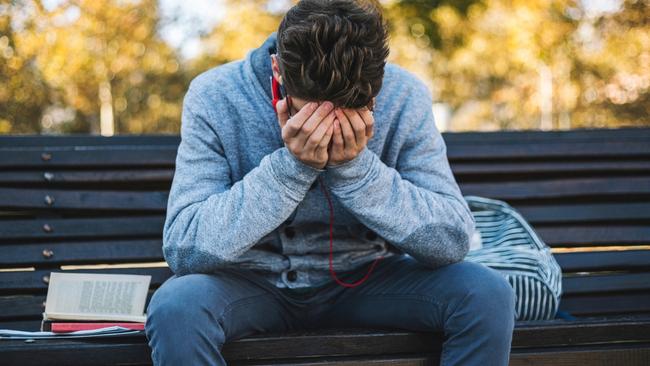'Mum, they want $5000 or they'll release the pic'
"This is the lie I told my son in that moment - and I'm sure it saved his life."
Parenting
Don't miss out on the headlines from Parenting. Followed categories will be added to My News.
When my panicked and terrified 15-year-old told me scammers were demanding $5000 for a 'dick pic' he'd apparently sent, I knew exactly what I had to do.
(If you think your teen has never sent, or will send, a nude text - wake up.)
I was confident that I could protect him from the predators wanting the money - but I couldn't protect him from what his 'mates' would do if they saw the photo. I'd have to arm him for that.
As far too many cases have shown us, being prepared to deal with things could be the difference between him being alive, or taking his life.
Want to join the family? Sign up to our Kidspot newsletter for more stories like this.
RELATED: She was oblivious that this could happen to her child
"Things haven't been the same since the photo"
I'm not an expert in sextortion, but I've lived through it as a parent. I can share my experience to help in this criminal scourge on our kids.
This week, Scott Pape, The Barefoot Investor, wrote about a young man who wasn't aware of who he was dealing with online. His nude photo was thus shared with his contacts... and the ensuing horrific bullying eventually led to him taking his life.
He had told his dad about the sextortion, and seemed to be coping with the huge social fallout.
But he wasn't. The note he left his father said, "Things haven’t been the same for me since that photo. I’m really embarrassed. I’ve let you down."
If you read any victim of sextortion's story that has ended in tragedy, you'll recognise that those words could have been written by any of them.
So, I knew I had to act.

RELATED: My teen was nearly a victim of sextortion
"I told my son to lie and deny"
I prepared my kid with solid responses - comebacks - for the crap he might (most likely would) hear or read.
Firstly, don't respond to anyone - block them online, ignore them at school. Easier said than done? Maybe, but it's worth talking about the power of silence, and plausible deniability. Where there's no solid proof, there's nothing to talk about.
When the stakes are this high: lie.
"You don't need to admit to anyone what's happened and confirm to them that you sent a photo. If they release it to your contacts, you don't need to respond as though you have something to be ashamed of. You don't need to tell anyone it's you," I told him.
I explained that bullies use the currency of shame to get to their victims. Are they 'poor', 'ugly', 'queer' - things that they 'shouldn't' be? Should a victim feel embarrassed, ashamed or inferior just because they bullies say so?
Of course not.
So lie and deny. In this era of Photoshop and AI, anyone can create a photo of anything - tell people that. The pic my son sent didn't have his face in it - but the predators could mock one up - and he needed to be prepared with a response that could minimize things for him.
I also told him to remember that bullies are 'losers' - I mean, what kind of person goes around tormenting others? People with nothing better to do. Losers.
And their opinion of him doesn't matter.
I stand by this advice in this instance. He's learned a huge lesson. He was relieved to know there are options on how to respond to attacks.
For a kid who's had depression, been suicidal... for a child with a vulnerable mind - he must know he always had options. Taking his own life isn't one of them.
More online safety advice for parents
Adam Whittington is the CEO of Project Rescue Children (PRC). Their motto is, “We hunt those who hunt children.”
He also regularly posts about online child safety incidents to his 60k-strong following.
For example, speaking to Kidspot last year on device usage by children, Whittington warned:
"Parents must regularly monitor their kids' devices. Check all devices and recheck periodically.
"Know what they are watching, who they are chatting to, and the apps they use. It's crucial parents understand and become experts on each app their kids use. Know the safety guarding settings each app has and use them.
"For the actual devices, make sure parental safety settings, like Google’s SafeSearch, are turned on. One of the easiest ways to block porn is by activating Google SafeSearch. When activated, Google SafeSearch will filter out explicit content from the search results, restricting kids’ access to them.
"I wouldn’t say turn off the internet completely because kids especially in advanced countries now have their school curriculum on smart devices. Cutting off your kids' internet actually prevents and limits their education. My kids' school lessons are all on smart devices now, even in class."
For expert advice see How to keep teens safe online from predators: ex-detective’s advice.
More Coverage
Originally published as 'Mum, they want $5000 or they'll release the pic'




